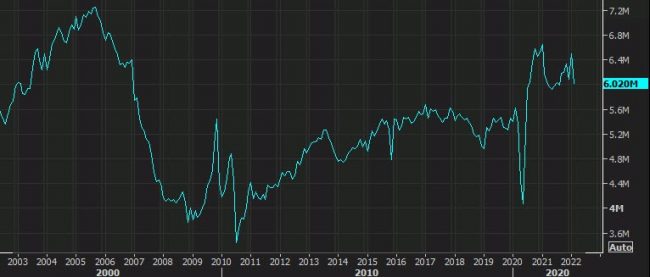- Prior was 6.50m (revised to 6.49m)
- Sales -7.2% vs +6.6% prior
- Inventories at 1.7 months
- Prices +15.0% y/y to $357.3K
- Full report
The issue in the US is inventories; they’re extremely tight. I highlighted more on US housing earlier but I’ll repeat it here and US home price inflation
Inflation
Inflation is defined as a quantitative measure of the rate in which the average price level of goods and services in an economy or country increases over a period of time. It is the rise in the general level of prices where a given currency effectively buys less than it did in prior periods.In terms of assessing the strength or currencies, and by extension foreign exchange, inflation or measures of it are extremely influential. Inflation stems from the overall creation of money. This money is measured by the level of the total money supply of a specific currency, for example the US dollar, which is constantly increasing. However, an increase in the money supply does not necessarily mean that there is inflation. What leads to inflation is a faster increase in the money supply in relation to the wealth produced (measured with GDP). As such, this generates pressure of demand on a supply that does not increase at the same rate. The consumer price index then increases, generating inflation.How Does Inflation Affect Forex?The level of inflation has a direct impact on the exchange rate between two currencies on several levels.This includes purchasing power parity, which attempts to compare different purchasing powers of each country according to the general price level. In doing so, this makes it possible to determine the country with the most expensive cost of living.The currency with the higher inflation rate consequently loses value and depreciates, while the currency with the lower inflation rate appreciates on the forex market.Interest rates are also impacted. Inflation rates that are too high push interest rates up, which has the effect of depreciating the currency on foreign exchange. Conversely, inflation that is too low (or deflation) pushes interest rates down, which has the effect of appreciating the currency on the forex market.
Inflation is defined as a quantitative measure of the rate in which the average price level of goods and services in an economy or country increases over a period of time. It is the rise in the general level of prices where a given currency effectively buys less than it did in prior periods.In terms of assessing the strength or currencies, and by extension foreign exchange, inflation or measures of it are extremely influential. Inflation stems from the overall creation of money. This money is measured by the level of the total money supply of a specific currency, for example the US dollar, which is constantly increasing. However, an increase in the money supply does not necessarily mean that there is inflation. What leads to inflation is a faster increase in the money supply in relation to the wealth produced (measured with GDP). As such, this generates pressure of demand on a supply that does not increase at the same rate. The consumer price index then increases, generating inflation.How Does Inflation Affect Forex?The level of inflation has a direct impact on the exchange rate between two currencies on several levels.This includes purchasing power parity, which attempts to compare different purchasing powers of each country according to the general price level. In doing so, this makes it possible to determine the country with the most expensive cost of living.The currency with the higher inflation rate consequently loses value and depreciates, while the currency with the lower inflation rate appreciates on the forex market.Interest rates are also impacted. Inflation rates that are too high push interest rates up, which has the effect of depreciating the currency on foreign exchange. Conversely, inflation that is too low (or deflation) pushes interest rates down, which has the effect of appreciating the currency on the forex market.
Read this Term looks set to continue for an extended period:
From CIBC:
Freddie Mac reported that the 30-year fixed rate mortgage survey averaged 4.16% this week, up from 3.85% a week ago and well above the 3.09% level a year ago. Mortgage News Daily (more accurate for capturing movements later in the week) pegs rates to be 4.50% (up 22 bps W/W) after considerable weakness in bond markets. Despite facing higher monthly payments, Redfin’s latest data showed home prices saw their largest four-week jump in over five years, surging 7% M/M. Redfin’s Homebuyer Demand Index for last week was 10% higher than a year ago (up 1.6% W/W). The real estate brokerage’s data indicates active listings were down 23% Y/Y (and 50% lower than 2020) to an all-time low, while median home sale prices over the past four weeks are up 17% Y/Y to a record $376K (36% higher than two years ago).
USD unchanged on this report.
Here’s the commentary from NAR:
“Housing affordability continues to be a major challenge, as buyers are getting a double whammy: rising mortgage rates and sustained price increases,” said Lawrence Yun, NAR’s chief economist. “Some who had previously qualified at a 3% mortgage rate are no longer able to buy at the 4% rate.
“Monthly payments have risen by 28% from one year ago – which interestingly is not a part of the consumer price index – and the market remains swift with multiple offers still being recorded on most properties.”
…
“The sharp jump in mortgage rates and increasing inflation is taking a heavy toll on consumers’ savings,” he said. “However, I expect the pace of price appreciation to slow as demand cools and as supply improves somewhat due to more home construction.”
www.forexlive.com
